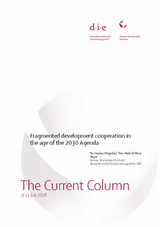Fragmented development cooperation in the age of the 2030 Agenda
Klingebiel, Stephan / Timo Mahn / Mario NegreThe Current Column (2016)
Bonn: German Development Institute / Deutsches Institut für Entwicklungspolitik (DIE) (The Current Column of 11 July 2016)
Bonn, 11 July 2016. Where do we stand with the implementation of the 2030 Agenda for Sustainable Development? Beginning today, this question will be addressed by state representatives at the 2016 High-level Political Forum (HLPF) on Sustainable Development in New York. One issue that is hugely relevant to the future of the Agenda, but that is barely taken into account on the Forum agenda, is fragmentation. This phenomenon sees an increasing proliferation of development actors and the simultaneous atomisation of goals, procedures, instruments and projects. It is giving rise to tremendous financial losses as transaction costs rise due to, inter alia, many actors engaging in similar activities in parallel to each other instead of working together, and to projects cancelling each other out to some extent in terms of their effectiveness. At the same time, however, fragmentation can sometimes lead to a greater diversity of offerings, as seen, for instance, in the innovative approaches of South-South cooperation. We examine these debates in a new edited volume entitled The Fragmentation of Aid.
Transnational cooperation in the context of fragmentation
Transnational cooperation in the context of fragmentation is now a widespread reality in an ever growing number of policy areas. The integration of different policy areas in one comprehensive approach has been a mantra of the 2030 Agenda from the outset. The term “fragmentation” refers to the considerable negative aspects of complexity in development cooperation and in other policy areas involving cross-border activities. Historically speaking, the growing need to manage and regulate globalisation processes has led to the establishment of many international institutions. The number of bilateral providers of development cooperation worldwide has grown from around a dozen in 1960 to over 60 at present, and there are also now well over 250 multilateral donors. One of the latest newcomers was the Asian Infrastructure Investment Bank. At the same time, however, development cooperation actors and partner countries could also benefit from an approach involving greater competition in response to the increased level of diversity. There is potential for more mutual learning, innovation and competitive selection among the different service providers in the development cooperation sector.
A fragmented 2030 Agenda?
There are two elements that are key to the implementation of the 2030 Agenda. First, negotiations on the Sustainable Development Goals (SDGs) were guided by the objective of integrating social, economic and environmental aspects. At the same time, the trade-offs inherent in the 17 SDGs, 169 targets and 230 indicators must not be glossed over as a result of a false understanding of integration. As seen in the example of using arable land to cultivate palm oil as an alternative fuel, there is clearly a degree of tension between individual indicators. The SDGs in the 2030 Agenda are characterised by the fact that they largely address cross-sectoral, highly complex and long-term issues. Against this backdrop, it will be vital in future to establish multi-actor networks among existing institutions in order to overcome instances of fragmentation. In the interests of transnational cooperation, these networks should also include actors from civil society and elsewhere. Second, there is a need for development partners and partner governments to develop new approaches and use technical instruments in order to address the increasing level of fragmentation. For instance, the European Union is employing the “Code of Conduct on Complementarity” and the “Division of Labour” in Development Policy, while the United Nations is using joint programming and the “Delivering as One” approach. At the same time, it is artificial to compare specialist development organisations, for example single-issue funds such as the Global Fund to Fight AIDS, Tuberculosis and Malaria, with the United Nations Development Programme, which is more general in nature. It is not a case of “either... or...”, but rather “both... and...”. This is where the limitations lie in seeking to rely primarily on technical approaches to effectively tackle the challenges of fragmentation, which have their origins in political, economic and other interests. As political support wanes, the pressure on development cooperation actors to focus on justifying their own existence is rising once more. Earmarking national donor contributions separately counteracts efforts to promote consolidation and harmonisation and may potentially cause more fragmentation. Brexit is likely to further hinder efforts to improve coordination of development cooperation work.
Consequently, in many cases, it is not in the interests of development actors to pro-actively address fragmentation issues. With annual costs for implementing the 2030 Agenda estimated at between USD 3 trillion and USD 5 trillion, more efficient and effective resource deployment could deliver huge savings. Intensive efforts to tackle the issue of fragmentation from the first year of the 2030 Agenda onwards are therefore the urgent order of the day.




